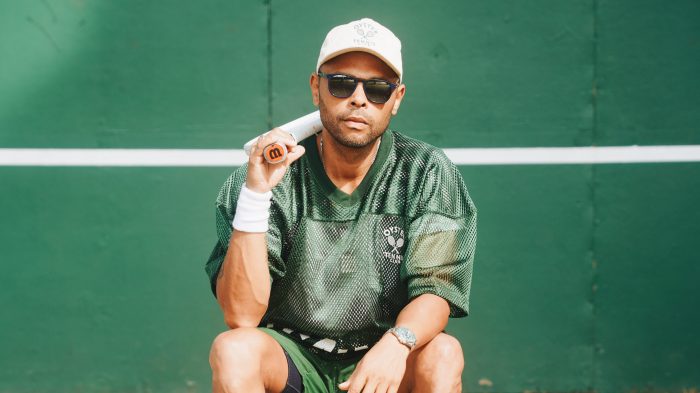The term lifestyle is sometimes only seen as a marketing pitch for products or brands, but for Chicago native Woodie White, it remains a much simpler concept: get out and do exciting stuff. The first time I saw him was in a series of YouTube videos he made with the Arizona Coyotes of the NHL. He starts by touring the team’s facilities and getting to know the daily routine of pro hockey players. Still, before long, he puts on protective gear, a jersey, skates and heads onto the ice. By the end, he’s watching the Coyotes play live and is fully engrossed in the action. “Man, I had a great time,” White recalled excitedly. “I think that’s what I’m looking for out of life. It’s always nice to pick up new things, like new hobbies, and new interests, and that’s what I’ve been on. Just whatever interests me.”
Oyster Tennis Club founder Woodie White wears his On collaboration sneakers and pieces from the Oyster Tennis Club apparel collection.
Sam Macon for Oyster Tennis Club
White started the brand Oyster Holdings in 2014 with a business ethos of “Traveling is a sport” and a range of styles to wear while traveling. Over the next decade, Oyster expanded to Oyster Expedition, a hiking and outdoor expedition group, and Oyster Tennis Club, a weekly meetup of people playing tennis on public courts. The goal is to have more regular people, particularly Black people, participating in these sports and activities. Now, Oyster Tennis Club has collaborated with Swiss sportswear company On to create The Roger Clubhouse Pro, a performance-ready sneaker made for playing tennis and living life.
The clean and restrained design nods to the sport’s history. Its ivory and evergreen colorway recalls the grass courts of Wimbledon, where the sneaker’s namesake, former tennis player Roger Federer, won a record eight times. The same CloudTec performance features that make the brand beloved by runners also point to the sport’s future, making the model playable on multiple surfaces and wearable in different contexts. “This, to me, is a performance shoe. But it has the feeling of a modern shoe you want in your rotation,” White said. “That means when I go out in the morning and go to work and run around, and then we have Oyster Tennis Club on Wednesday at 6 p.m., I’m in the same shoes.” The Clubhouse Pro is also equipped with additional cushioning along the midsole. White hesitates to call the collaboration with On a lifestyle sneaker. “I don’t really believe in this category of lifestyle footwear. A lifestyle to me is something you live, not something you make when it comes to product.”
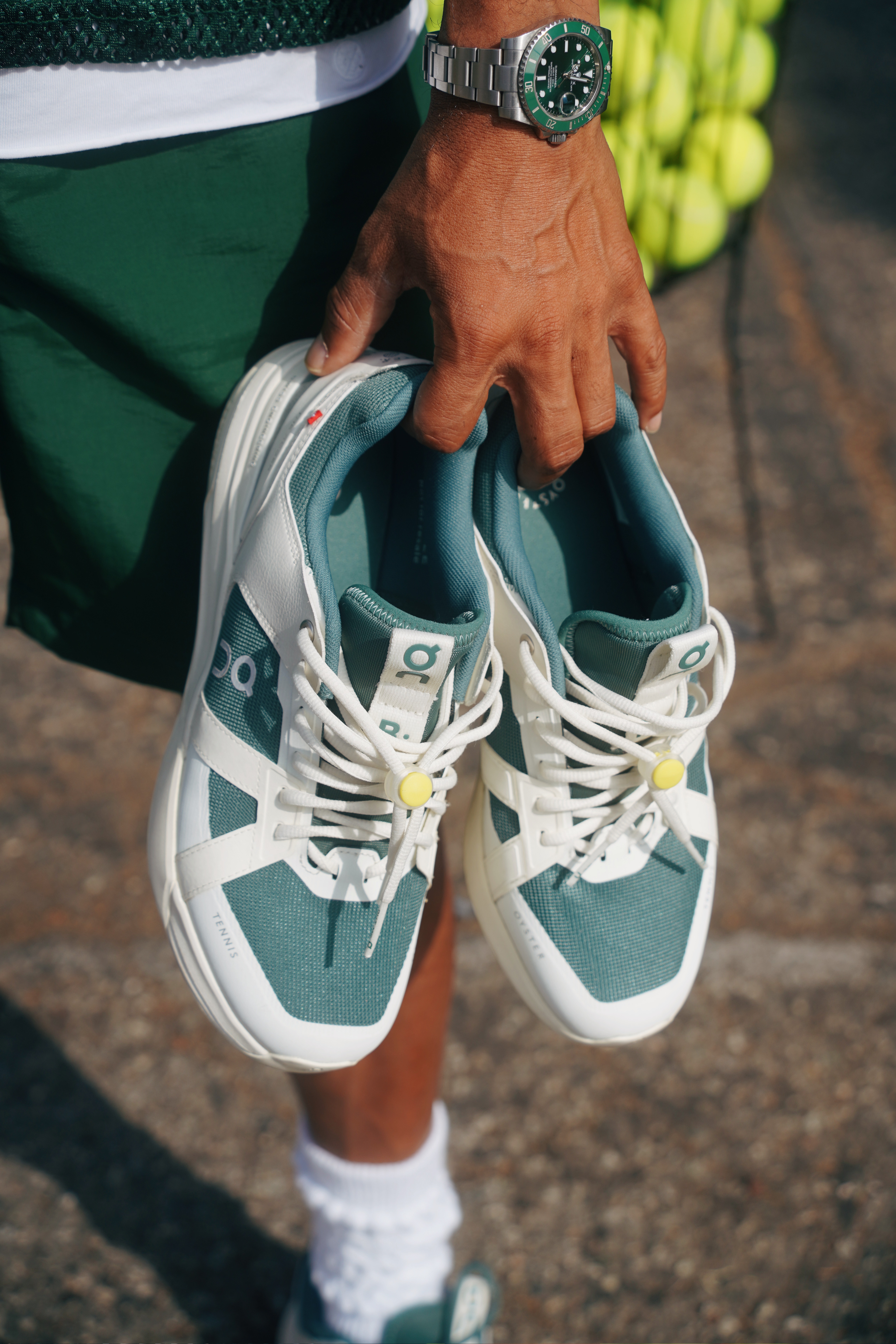
Sam Macon for Oyster Tennis Club
Oyster Tennis Club x On The Roger Clubhouse Pro sneakers feature a royal green reminiscent of tennis courts worldwide.
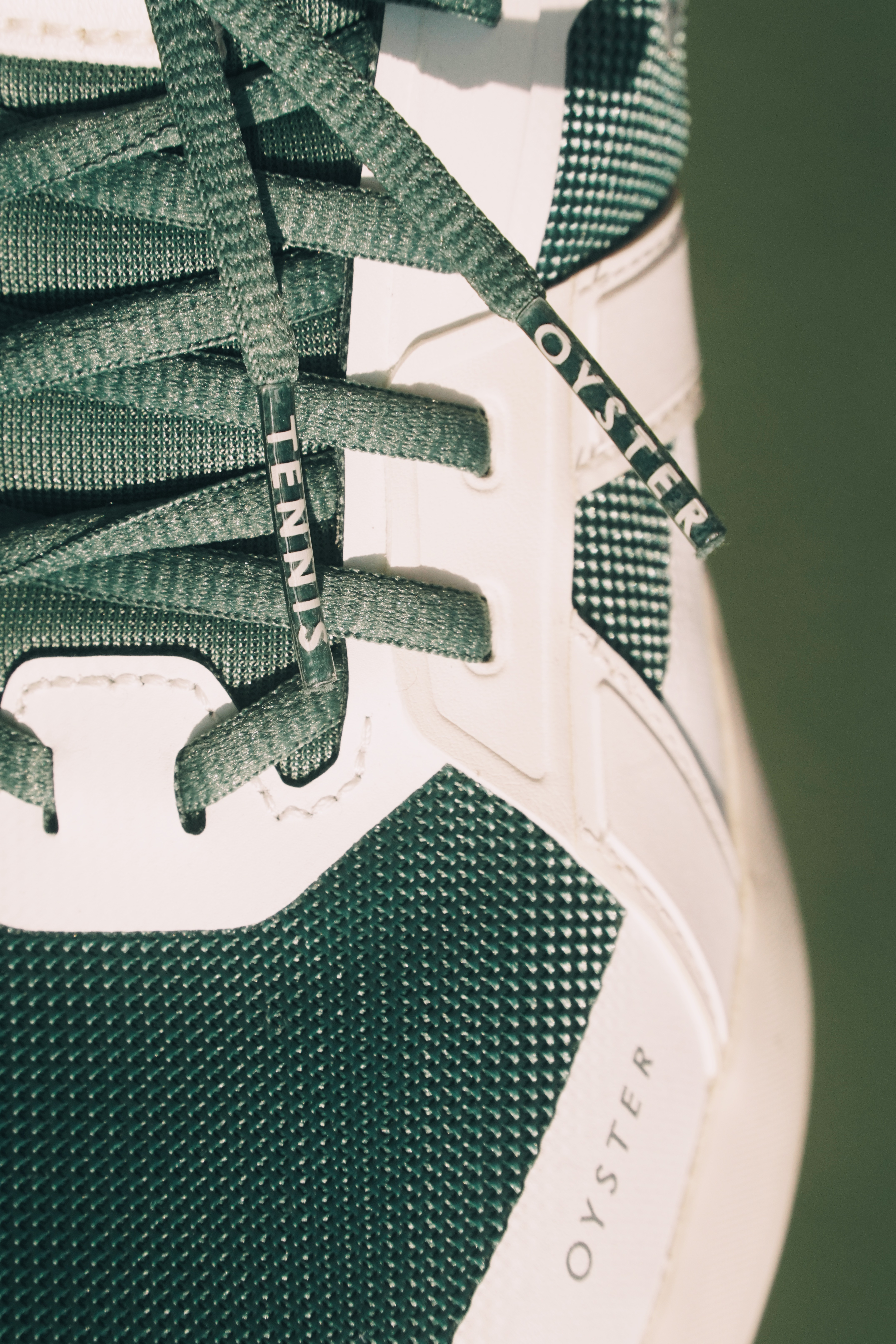
Sam Macon for Oyster Tennis Club
The lace aglets feature Oyster Tennis Club branding.
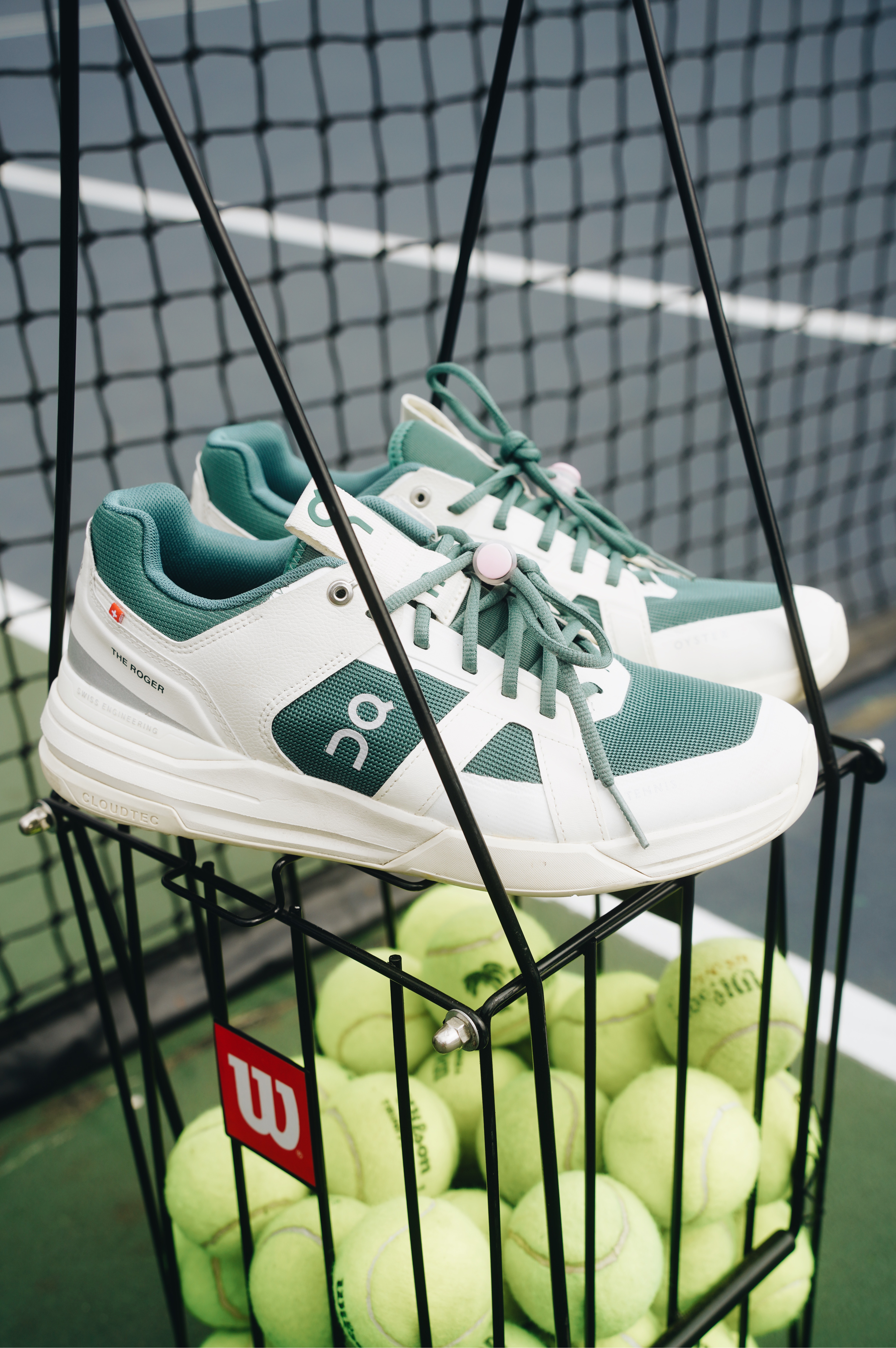
Sam Macon for Oyster Tennis Club
The Oyster Tennis Club x The Roger Clubhouse Pro sneakers by On.
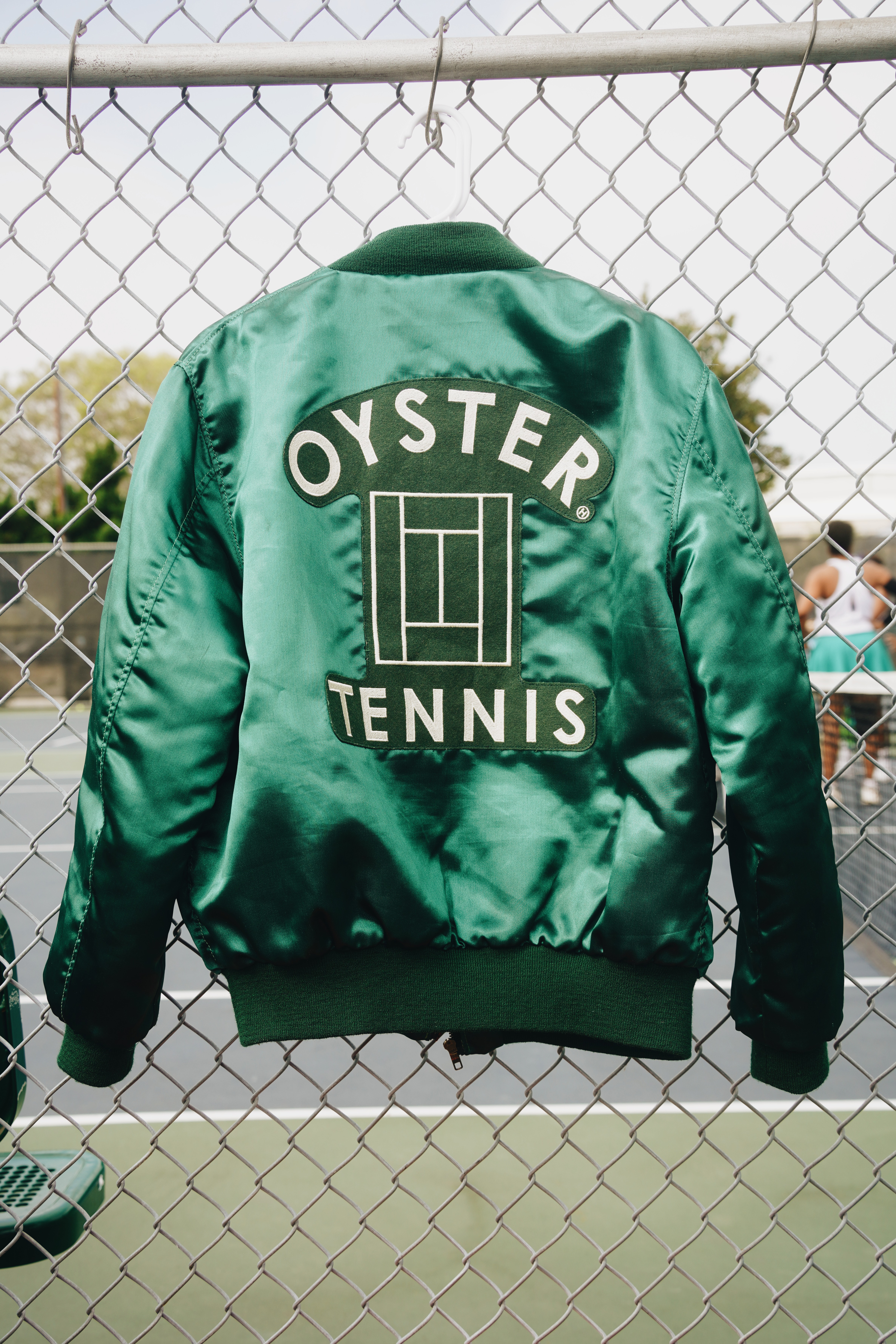
Sam Macon for Oyster Tennis Club
A satin bomber jacket from the Oyster Tennis Club apparel collection.
Tennis sneakers have a deep cultural history, from the legendary Stan Smith shoes by Adidas to effortlessly cool Rod Lavers that debuted in 1970 to the neon-colored and irreverent Nike Air Tech Challenge worn by Andre Agassi and the Reebok Court Victory Pumps worn by Michael Chang, both in the 1990s. However, those sneakers’ place in the cultural zeitgeist has as much to do with how regular people wore them daily as they did with athletic achievement. Tennis can feel cloistered behind the tall hedges of country clubs or the locked doors of cost-prohibitive training complexes. US Open finalist Francis Tiafoe was only introduced to the sport because his father was the head of maintenance at the suburban Junior Tennis Champions Center outside of Washington, where he and his family sometimes slept in a storage room.
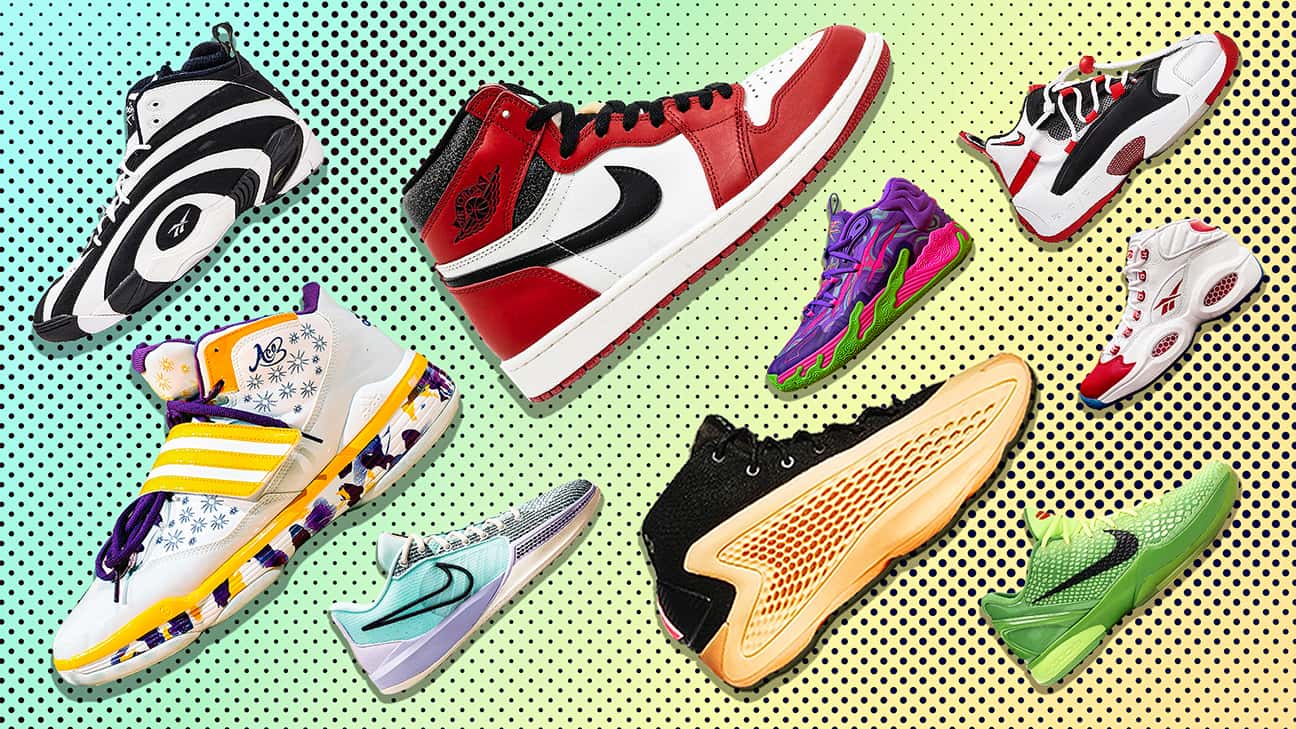 A Sneakerhead’s Dream: Dive into the Signature Sneaker DatabaseRead now
A Sneakerhead’s Dream: Dive into the Signature Sneaker DatabaseRead now
A familiar theme in fashion, particularly Black fashion, has been to take traditionally elite, Ivy League, country club aesthetics — polo shirts, oxford cloth button-downs, striped rugby shirts, tennis shoes — and transform them into a more democratic, accessible and stylish design. Changing the different canvases upon which the clothing is presented — from suburban to urban, private to public — can completely recontextualize the garments and their wearers. The Roger Clubhouse Pro is both part of and separate from that tradition. “It’s like we took this country club aesthetic of white and green, put it on a professional tennis model, but then brought it to a park,” White said. “So, it’s that same luxury aesthetic, but now you’re seeing it at the park with cracked courts.”
Oyster Tennis Club attempts to further the subversion by recontextualizing the gear, where it should be worn, who plays the game, and where it should be played. “The community part, and me being involved in these spaces that are traditionally not ours, was just an interest that I had,” White said. “I’ve had experiences in certain neighborhoods where people approach us, asking us do you live around here,” White said, recalling Oyster Tennis Club events. “Because you’re in Pacific Palisades playing tennis at a public court, but the attitude is like, ‘What are you doing driving through the hills to find this tennis court?’ And that’s when you realize you’re not welcome over there.”
The next time I see White is via a Zoom call. Due to a bit of confusion over time zones when we scheduled our chat, it was early for him. But he’s on time and ready to talk as soon as he drinks some coffee. He’s in a pretty good mood. “I was just looking at the ’gram and I saw [footage from the]Shanghai Rolex Masters. Roger Federer pulled up and I’m just like, ‘Oh, cool. He’s at the Rolex Masters. He’s a Rolex athlete.’ And he hops out of the car and what does he have on: the Oyster Clubhouse Pros,” he said with a smile. With his sneaker collaboration making waves internationally, what could be next for Oyster Tennis Club? “More tennis. We’re gonna be expanding to Atlanta. We wanna keep the free city tennis movement alive and bringing people out and building community.”
Greg Whitt is a writer from Washington, DC. His work has appeared in VIBE, Genius, Consequence of Sound and several other publications. He likes to freestyle when he’s by himself in the car.
